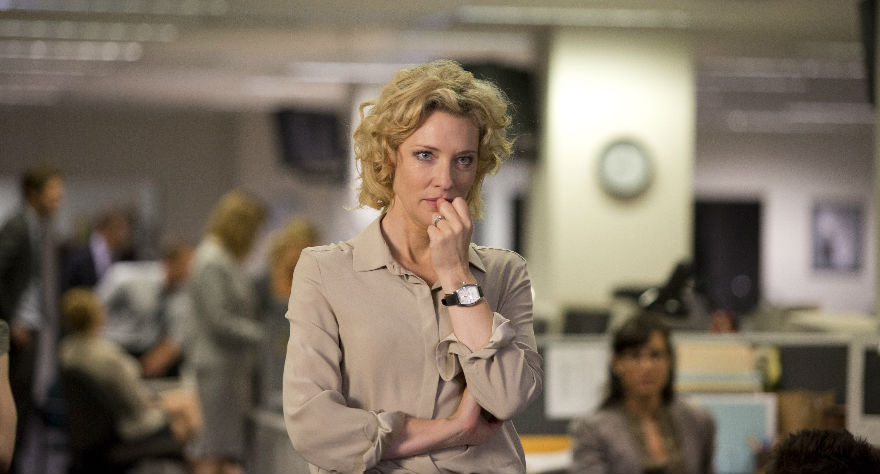
On-the-nose drama plagues this otherwise thrilling, eye-opening look into the 2004 '60 Minutes' scandal.

On-the-nose drama plagues this otherwise thrilling, eye-opening look into the 2004 '60 Minutes' scandal.
The state of independent, hard journalism hangs in the balance in Truth, a docudrama about the pivotal 2004 60 Minutes report in which veteran broadcaster Dan Rather called into question the validity of then-President George W. Bush’s military past. Based on the memoir by former 60 Minutes producer Mary Mapes, the film trumpets the heroism of journalists not afraid to ask any question necessary to get to the almighty truth. Writer and first-time director James Vanderbilt‘s messaging is heavy-handed to say the least (the script is full of loud monologues about journalistic integrity), but the humanistic layers of the story engage on a deeper level, with subtle, powerful character moments counter-balancing the bursts of righteous melodrama.
At the heart of the film is the relationship between Mapes (Cate Blanchett) and Rather (Robert Redford), who together broke the Bush story on CBS News. During their September 8, 2004 episode of 60 Minutes, they presented memos that indicated Bush may have pulled some strings in order to avoid the draft and falsified documents regarding his tenure at the Texas Air National Guard. In no time, right-wing media and bloggers offered up evidence that Bush’s record was legitimate, and that the documents uncovered by the 60 Minutes team were, in fact, fakes. Following a firestorm of controversy, Mapes, Rather and their team went down with their ship, losing their jobs at CBS News in a move that changed the complexion of modern news reporting.
The tragedy, according to Truth, isn’t that two of the most accomplished journalists in the field were fired, but that their original question about Bush’s records got swept aside so quickly. CBS’ media competitors spent an ungodly amount of time and resources covering the controversy surrounding Mapes and Rather and whether or not they were duped by their sources, time and resources that could have been better spent supporting the original question about the President committing fraudulence. Mapes and Rather are icons of old media, and their dismissal signaled the end of a more level-headed era of journalism when figures of power were forced to answer real questions face-to-face with someone like Rather, who at one time had the public’s full trust.
The most gripping aspect of the story revolves not around mass media, however, but Mapes and Rather, old friends who have a quasi father-daughter relationship (subtly expressed by Vanderbilt). As we learn, Mapes was reprimanded by her father for asking questions when she was young. In Rather, she finds a mentor who asks questions with her, a last-of-a-dying-breed confidant for whom she has bottomless admiration. Whenever Mary starts breaking down under pressure, Dan soothes her with his unflappable calmness and deliberately timed jabs of self-deprecation.
The casting of both Redford and Blanchett is excellent; they’re capturing the essence of their real-world counterparts rather than doing a shallow imitation. It comes as no surprise that the veteran actors are magic together, but the supporting get short-changed a bit. Filling out the rest of the 60 Minutes team are military consultant Lt. Colonel Roger Charles (Dennis Quaid) and researchers Lucy Scott (Elizabeth Moss) and Mike Smith (Topher Grace). It hurts a little to watch these three sit so far in the background (Grace goes for broke in his one showcase scene) though it’s understandable that Vanderbilt keeps the focus on Mapes.
The assignment of blame with regards to the scandal is a tricky thing since no party handled every situation properly. While Truth is clearly going to see Mapes’ side of the story the most clearly, the film does acknowledge the mistakes she and her team made in collecting evidence to back up their claims. The suits at CBS, who many believe should have stood by their people, aren’t painted as villains though it’s made very clear that their decision to fire the 60 Minutes team stood on the wrong side of journalism history.
In his first feature, Vanderbilt exhibits little style, though he does respect how priceless Redford and Blanchett look on-screen. At its most heavy-handed, the script is actually pretty cringeworthy. The film alludes to the connection between Mapes’ abusive father and the abusive media monster too heavily, to the point where she actually says she and her news team are being “smacked down” for asking honest questions. The symbolism would’ve rung true without all the underscoring.
Something we’ve seldom seen in movies is the chaotic hustle of a TV news production, something Truth depicts thrillingly. We see the Mapes team, just minutes prior to their deadline to turn in their Bush piece, gathered in the editing room, agonizing over what to cut to meet their required runtime. In the last moment, Mapes makes quick edits with a few flicks of the wrist and the show is ready to go. Frantic moments like these make Truth feel urgent and alive and incredibly entertaining. Were it not for the on-the-nose dramatic outbursts that throw everything out of whack, this might have been the best newsroom drama in years.